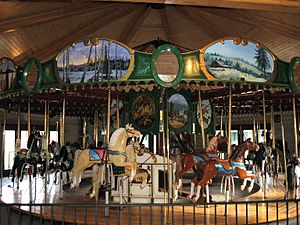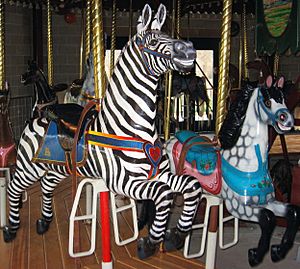Ferry County Carousel facts for kids
The Ferry County Carousel is a working wooden carousel located about three miles (5 km) east of Republic, Washington. You can find it at the Ferry County Fairgrounds. This special carousel has 24 horses arranged in two rows, and they can even jump up and down! It's one of only seven classic wooden carousels in Washington state, and it might even be the oldest one.
Contents
Discover the Carousel's Horses
This amazing carousel is made entirely of wood. It has 24 horses, set up in two rows. Each horse has a special "pillow" or saddle that can be removed.
Unique Horse Carvings
The horses were carved at different times, which you can see in their styles. Two styles are known by how their manes are carved. These styles come from the Armitage Herschell Company and the Herschell Spillman Company. Two other horses are thought to be carved by Charles Dare.
The Missing Horse Story
One horse was missing from the carousel for almost 15 years! Everyone thought it was lost forever. But then, someone found it in the garage of a house they had just bought. The horse was in very bad shape. It was sent to a special carver in Missoula, Montana to be fixed up.
Meet the Carousel Horses
Some horses are painted to look like common breeds. But many are named and painted to remember horses that sponsors knew or owned. The horses come in many colors, like Appaloosa and Red Sorrel, and even an African Paint. Their breeds are also very different. You can find a Morgan horse, a wild mustang, and even a Zebra!
The zebra, named "Echo Babe," is the carousel's newest "horse." She was donated by a carver named Joanne Sessions. A local mining company sponsored her so kids could have a zebra to ride. The horses "Mary Jane" and "Frosty" are believed to be carved by Charles Dane.
The 4-H Club's Contribution
When the carousel was being fixed, the Keller, Washington 4-H club wanted to help. They had saved $400 for a project. They needed $1,000 to sponsor a horse. The club asked the Colville Confederated Tribes for the rest of the money, and they got it!
To honor this help, artist Sandy Shiflett painted "Running Brave." This horse is an Appaloosa mustang with traditional feathers in its mane. It also has war paint on its rump. The saddle blanket has a 4-H Clover on it. There's also a sunflower carving on the saddle, honoring the Keller area.
Artistic Touches and Lights
Local artists painted each of the running boards. They show different landscapes from around the county. The back panels have scenes of wildlife, country life, and history. One scene was painted by the famous western artist Everett Russell, who lived in Ferry County.
Even kids helped with the "This Little Light of Mine" project. For $10, you could sponsor one of the 540 lights on the carousel in a child's name. A Republic High School senior painted a special board. It shows the sponsors and where to find their light on the carousel.
Carousel Music
No one knows if this carousel originally had an organ. Today, music comes from a CD player. It was donated from Spokane. The CD player is hidden behind a carved front, also donated by a wood carver from Spokane.
Early Days of the Carousel
We don't know the exact year this carousel was built. But its simple horse styles show it's from the "golden age" of carousel building in America. This was between 1890 and 1900. It was built in a style common for traveling "Country fair" carousels. It has two rows, with twelve horses in each row.
Who Built It?
The carousel was made by either the Armitage Herschell Company or the Herschell Spillman Company. During the golden age, about 2,000 to 3,000 carousels were built. But in 2000, only 208 were still listed by the National Carousel Association. We don't know who first owned this carousel or where it first went.
How It Changed Over Time
The horses originally had "belly mounts." This means the carousel was first moved by a track. But at some point, the track was replaced. In 1935, Hatfield Engineering built a new mechanism. This changed the carousel to the jumping style we see today.
Bringing the Carousel to Ferry County
At some point, a carnival or the City of Tacoma, Washington bought the carousel. It stayed there until 1958.
The Journey to Ferry County
In 1958, a group of farmers from Ferry County found the carousel in Tacoma. They got a $2,000 loan to buy it from the Tacoma owner. The entire carousel was then moved to the Ferry County fairgrounds. It traveled on the back of a wheat truck!
After its arrival, the carousel was repainted. It got an art deco style makeover. This included metal running boards and neon lights. These were the last big changes until the mid-1990s.
Restoring the Carousel
Ferry County has hot summers and freezing winters. Almost 30 years of this weather damaged the carousel. In 1993, county residents decided to restore it. They worked with the county government to make it happen.
Protecting the Carousel's Future
This led to an agreement that the county would never sell the carousel outside the county. A group called the Merry-Go-Round Friends Committee was formed to manage the project. The restoration was estimated to cost about $30,000. This included $1,000 for each horse and $6,000 for the machinery.
In just one year, the committee raised almost half of the total cost! People in the community could sponsor any part of the carousel. This included the horses, the backboards, and even individual lights. Each person who sponsored a horse also got to name it.
Many local artists also gave their time and skills. They helped repaint and fix up the horses and scenery. Carousel fans from all over the United States also helped these local volunteers.
A New Home for the Carousel
In 1995, another project began to protect the carousel even more. The goal was to build a permanent home for it. This happened around the same time officials from the National Carousel Association visited. A new committee was formed to oversee the building's construction.
Community Support for the Building
Many people donated a lot of money to this project. The community alone raised $80,000! The construction was helped by the Curlew Job Corps building-trades classes. Crews from Colville and Seattle also donated a week of work. They wanted to finish the building before winter.
The new building is about 5,500-square-foot (510 m2). It has an octagonal room for the carousel. It also has a meeting room, restrooms, and a full kitchen. A beautiful stained glass piece was donated for the restoration. It shows a white carousel horse with a black saddle. This piece, made by artist Bonnie Schmidt, was put into the carousel room.
 | Victor J. Glover |
 | Yvonne Cagle |
 | Jeanette Epps |
 | Bernard A. Harris Jr. |



